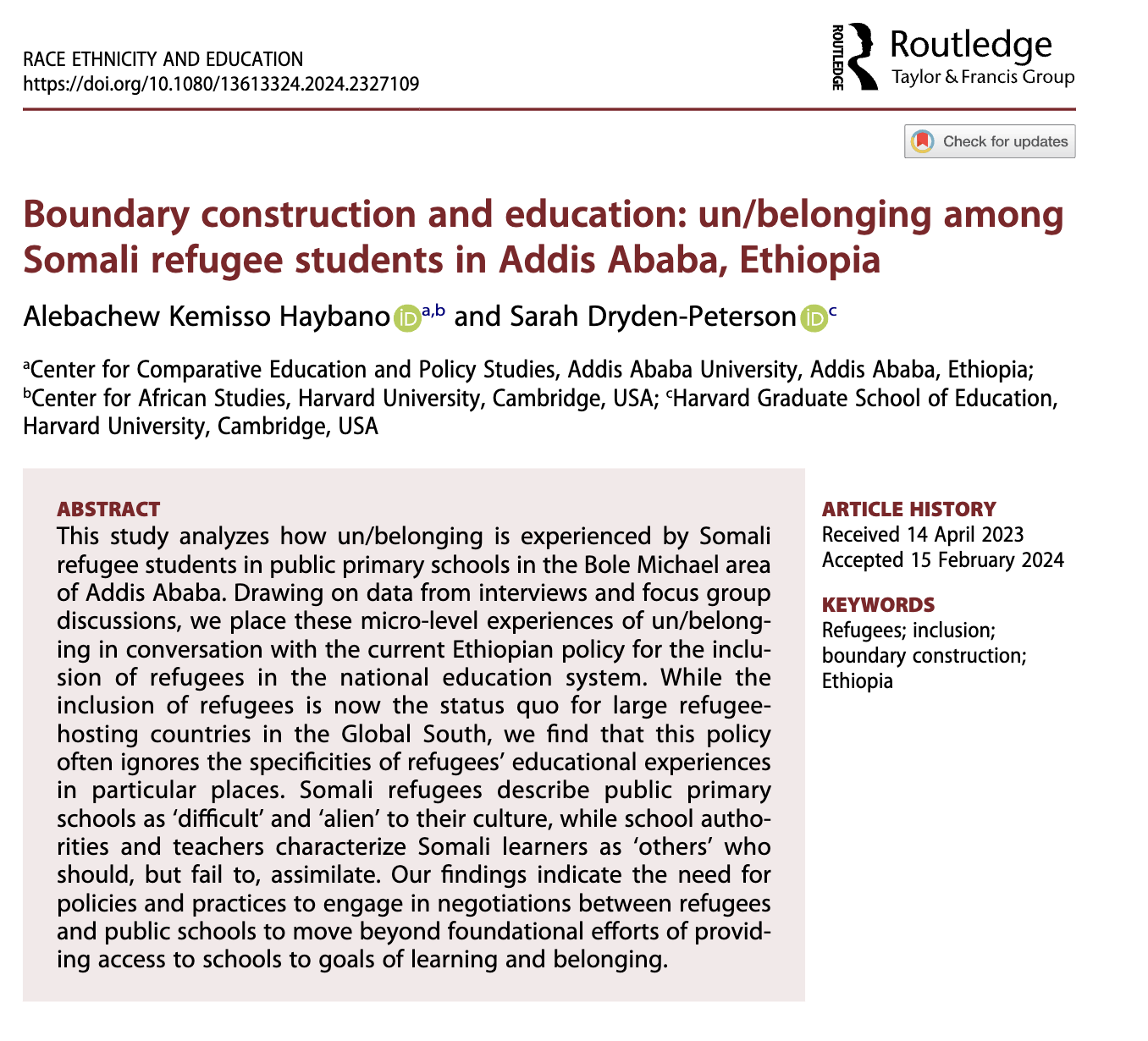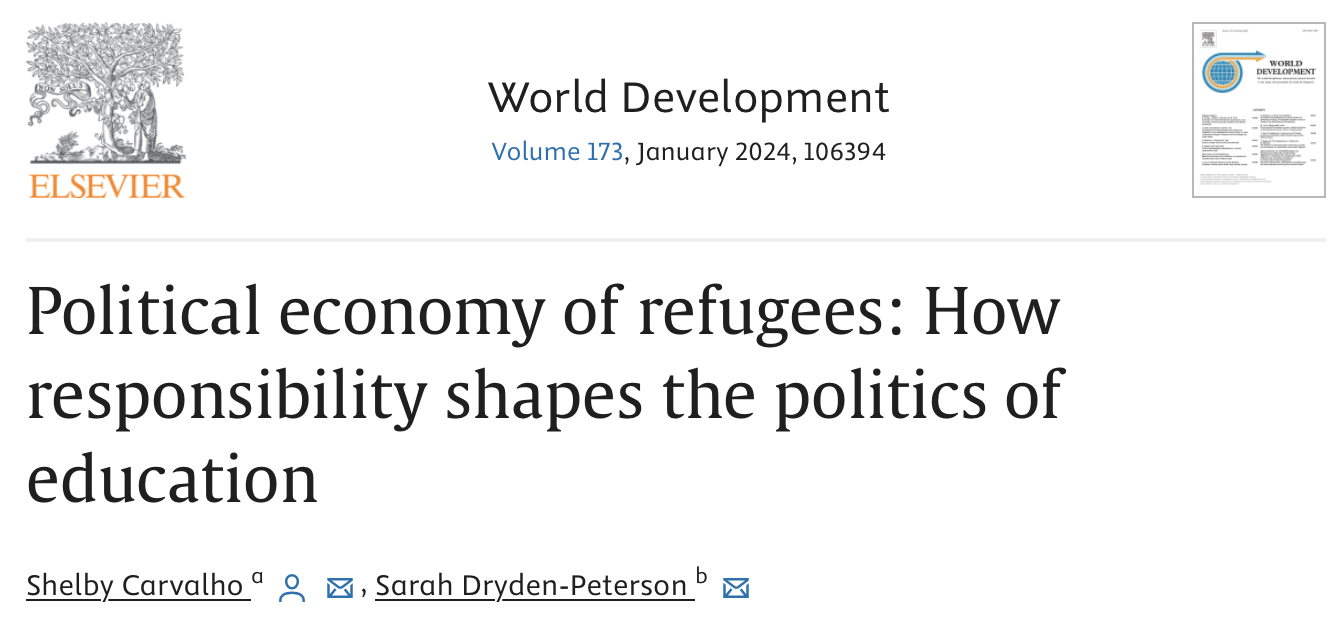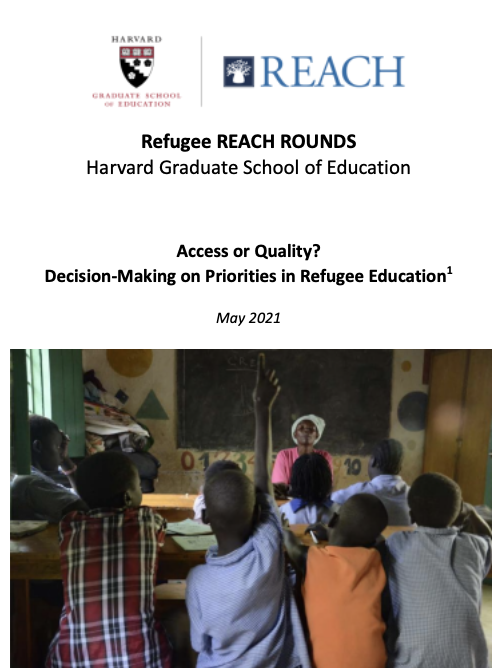Research | Refugee students often live in contexts where the inclusion and peace they build within classrooms is met with exclusion and violence in other spaces of their lives, both inside and outside the school. To address this dissonance, teachers of refugees engage in a constant balancing act: teaching their students both for the world that exists and for a world that they wish existed. In research with teachers and students across contexts of conflict and refuge, we observe specific constructive elements of these approaches to teaching and learning, which we call pedagogies of belonging. These pedagogies of belonging are rooted in predictability, adaptability, and future-building, and guided by relationship-building. In considering how more teachers might learn from them and incorporate them into their practices, I examine how teachers in one school in Lebanon who do use these pedagogies have come to do so.
Read MoreResearch | Like all education, refugee education has a double purpose of formation of individuals and formation of societies. This can be seen as the double purpose of education: helping students live a good life in a world worth living in. This includes a view about how people should live in the world, and the kind of world we should try to establish.
Utilizing Jurgen Habermas’s notion of system and lifeworld and theories of practice, this article explores how teachers in South African, Finnish and Australian schools work towards the double purpose of education. Our focus is on the teachers’ visions of what they are doing, and how these practices are impacted by the larger contexts in which students live. The findings show that teachers understand that refugee students will face barriers in their national systems and aim, through their pedagogical practices, to bridge students’ lifeworlds and educational system demands.
Read MoreThe Power Rainbow is a pedagogical tool and framework to support children in power analysis — the ability to make sense of power and how it shapes our lives and societies. It is a graphic representation of nested systems of power, and concretizes the abstract concept of systemic power through shape, color, and text. The Power Rainbow scaffolds the type of structural thinking necessary to research and take action towards more just futures. The tool was originally developed to support children in Critical Participatory Action Research (CPAR), but it can also be used in critical pedagogy more broadly, such as to support action projects in schools, in workshops with children and caregivers, and in understanding our own lives.
Read MoreExploring Safety, Community and Learning is a K-5 curriculum inspired by Zuhra Faizi's educator resource, Cultivating Trust: How Educators Can Build Relationships with their Afghan Refugee Students. We provide children’s books to spark activities and discussions surrounding key topics raised by Zuhra in this resource. While inspired by Zuhra’s research with Afghan youth, the curriculum is intended to be used with children from any community.
Read MoreThe Missing Colors is a picture book sharing the story of Putra, a child who is feeling grey (and depicted as being grey), while all of the other children around him are bright colors. This story explores belonging, friendship, and taking care of ourselves and one another.
Read MoreResearch | This article examines why and how teachers of refugees enact protection by engaging with local forms of harm facing their refugee students. Through portraits of two classrooms in Jordan, we describe the relationships that form between Jordanian teachers and Syrian students, and the protection practices teachers develop in response. We propose a more comprehensive conceptualization of protection in refugee education that layers socio-political protection on legal and rights-based protection commonly embedded in humanitarian activities.
Read MoreArticle | Refugee REACH director Sarah Dryden-Peterson examines lessons from the field of refugee education for times of uncertainty, including current and future pandemics. She outlines three elements of “pedagogies of belonging:” pedagogies of predictability, adaptability, and future-building.
Read MoreArticle | There is a gap between the futures that refugee young people imagine will be possible through their education and the plausible futures in exile, where opportunities are truncated by social, economic, and political exclusions. Our study examines how education can narrow this gap. Through interviews with Syrian students in Lebanon, we document fixed and malleable elements of education that refugee students identify as bridging their current education and their futures. Students experience the structures and content of schooling in Lebanon as both exclusionary and immutable, yet their teachers use what we call relational pedagogies rooted in predictability, explaining, fairness, and care to support students’ learning and navigation toward future opportunities.
Read MoreArticle | Limitations on membership and participation in host societies sharply constrain refugee young people’s civic development. Especially when refugees attend national schools, they find themselves submerged in civic learning that does not include them or represent their experiences and realities. To explore possibilities for civic learning among refugees, we examine the education created by a Syrian community inside the structures of a Lebanese private school in Beirut. We conceive of this school as a ‘borderlands’ and find that it supports civic membership and participation in three ways: through adaptations to the Lebanese structures, curricula, and languages of schooling; through pedagogies focused on pragmatism; and through opening limited spaces for students to practice civic skills. We argue that the borderlands space created by this school holds lessons for both refugee and national teachers and school systems seeking to foster civic learning among refugees.
Read MoreArticle | Education is one of the key tools of nation-building, as it aims to create future citizens. Yet what happens in seemingly ‘futureless’ contexts where refugees cannot access even social membership, let alone legal citizenship? In this introduction to our special issue on education for refugees, we explore the aspirations and conceptions of possible futures that students, teachers, governments, international non-governmental organizations (INGOs), and funders have when they promote and pursue education as the solution to the liminal position that refugees in protracted refugee situations find themselves in. Based on insights from the articles, we analyse disconnects between aspirations for education and realities of access to quality education and to opportunities after completing education. We argue that to address these disconnects requires us to move beyond temporal and spatial binaries—present vs. future, here vs. there—that are so common in refugee education discourse and policy. Our suggestion is to draw on and support stakeholders’ work, powerfully exemplified in this special issue, to contribute to improved conditions through pedagogies, practices, and policies that address these binaries.
Read MoreArticle | This study analyzes how un/belonging is experienced by Somali refugee students in public primary schools in the Bole Michael area of Addis Ababa. Drawing on data from interviews and focus group discussions, we place these micro-level experiences of un/belonging in conversation with the current Ethiopian policy for the inclusion of refugees in the national education system. While the inclusion of refugees is now the status quo for large refugee-hosting countries in the Global South, we find that this policy often ignores the specificities of refugees’ educational experiences in particular places. Somali refugees describe public primary schools as ‘difficult’ and ‘alien’ to their culture, while school authorities and teachers characterize Somali learners as ‘others’ who should, but fail to, assimilate. Our findings indicate the need for policies and practices to engage in negotiations between refugees and public schools to move beyond foundational efforts of providing access to schools to goals of learning and belonging.
Read MoreResearch | The political economy for refugees can be understood as distinct from the political economy for citizens as it requires addressing fundamental questions of responsibility and assumptions about time horizons. This is particularly true in education, which is by nature a long-term engagement and investment and for which responsibility is presumed to lie with governments. As host countries and the global community grapple with decisions about how to provide refugee education, it is critical to understand how the political economy for refugees and for citizens may differ to ensure that approaches are equitable and effective for refugees and host communities.
Read MoreResource | Refugee Stories: Education: Obstacles and Aspirations draws on findings from a doctoral research on young refugees’ educational experiences in England. The study investigated how young refugee people and their families have encountered the education system while considering the implications of living as refugees in England. Young refugee people’s right to education is enshrined in British law; however, the UK has no specific educational policy for them.Invisibilizing practices add to the silence around their experiences and needs. Refugee Stories tells young refugees’ and families’ stories to amplify their voices and shine a light on the social and material conditions they experience.
Read MoreRefugee REACH ROUNDS aim to foster discussions on common dilemmas of practice experienced by researchers, policymakers, and educators working in settings of migration and displacement. Our hope is that through dialogue and debate on really challenging questions and dilemmas in our field, together we can advance our collective understanding and find ways to promote quality education and welcoming communities for all in settings of migration and displacement.
Read More












